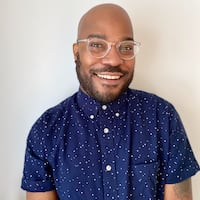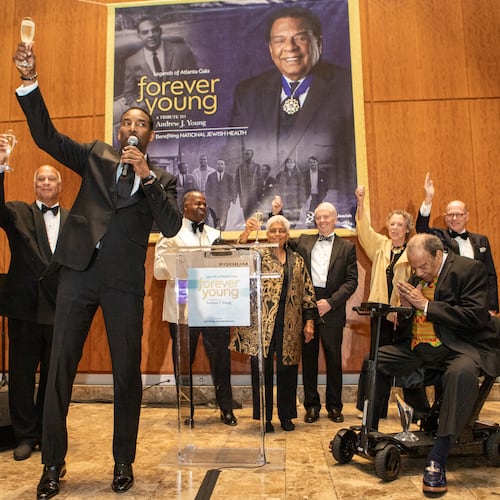Ashleigh Beverly couldn’t stop people watching.
It was 2015, and she was walking around Lakewood Amphitheatre.
Beverly caught wind of something called One Musicfest, featuring sets from Lauryn Hill, The Roots, Janelle Monae and Wale. She figured, why not drive to Atlanta from Tallahassee, Florida?
When she arrived, in addition to an ideal live music soundtrack, the crowd was diverse. Black women complimented each other on their beauty. The men, too, were easy on the eyes. Everyone was smiling. A sense of comfort took over. There was no drama, just vibes. “The festival — it felt like home,” she said.
Beverly, a native of Baltimore, now lives in Atlanta. One Musicfest is her favorite event, the city’s annual, homegrown, two-day celebration of Black music and culture that brings 100,000-plus attendees. Beverly hasn’t missed one since making her debut nearly a decade ago.
The 15th edition of the Black, independently owned event takes place Saturday and Sunday in Old Fourth Ward’s Central Park. This year’s eclectic lineup features headliners Earth, Wind and Fire, Cardi B, Nelly, Gunna, Jill Scott and Victoria Monet.
On Oct. 2, the festival organizers announced the event is moving from Piedmont Park to Central Park, a smaller space just over a mile away, due to “challenging logistics and economics” in the industry. The news comes as other locally based, multiday music events are going on hiatus or shutting down due to rising costs and other factors.
Despite some social media backlash in response to the announcement, One Musicfest’s founder and some attendees still expect much of the same.
“I just think whatever the hiccup may be now, I think it’s just because it’s growing,” Beverly said. “I think the vibe of the festival is still there in that regard.”
Buck the system
Speaking by phone nearly a week after news of the One Musicfest’s venue change, founder Jason “J” Carter is recalling his initial pitch to event producers, sponsors and investors: a festival version of his successful local event series, Sol Fusion.
Dubbed an “intercontinental lovefest,” Sol Fusion was Carter’s attempt to show that Black creativity was not monolithic, especially in music. The events featured DJs of different races playing rap, house, Afrobeat and other genres.
“It was come one, come all — accepting of all people, all types,” he said. “You saw politicians in these events. You saw dope boys. You saw corner office execs, schoolteachers, strippers and you never had any issues.”
A festival version of that seemed like an easy sell. It was not.
“When I first set out to do the festival and I spoke with some folks who did not look like me, they told me my idea was a liability,” he said. “They looked at Black culture and Black music as a liability.”
One Musicfest was Carter’s vision, introduced through an agency where he was a partner. There was no Black version of Woodstock, Lollapalooza or Bonnaroo, and representation in those lineups was limited.
Credit: Courtesy
Credit: Courtesy
He worked closely with peers such as One Musicfest festival director Oronike Odeleye, envisioning a music festival celebrating people who looked like them, with acts spanning genres and generations. They wanted a name that symbolized unity, community, connectivity and inclusion. They worked with artist and scholar Fahamu Pecou on a logo. One Musicfest was born.
The first festival occurred outside King Plow Arts Center in 2010. De La Soul and Common headlined. Just under 3,000 people showed up.
Carter called it humbling.
“I thought I had the experience, the wherewithal and the background to be able to produce a festival. I was mistaken,” he said. “You’re literally building the car as you’re driving.”
In the process, Carter learned that festivals — which require permitting, licensing and dealing with city departments like fire and police, along with vendors, event insurance and talent payment — can be overwhelming.
Eventually, the event made its way to Lakewood Amphitheatre, where an up-and-coming Kendrick Lamar performed in 2014.
Despite not turning a profit, festival producers and sponsors took notice. That same year, One Musicfest netted a coproduction deal with Live Nation that saw Lakewood serve as its home until 2017. The Lakewood run culminated with a lineup highlighted by Jill Scott, Yasiin Bey (formerly Mos Def), Damian “Jr. Gong” Marley, Sean Paul, Jidenna, Kaytranada, Too Short and Tank and the Bangas.
Though One Musicfest had been a single-day event, Carter always envisioned two days but was met with pushback from Live Nation.
“They couldn’t see how to scale it,” he said, adding that his partners were wary of expenses. “At that point I said, ‘Well, I’ve got to find somewhere else because I can’t keep doing it as a one-day.”
In 2018, One Musicfest parted with Live Nation and moved to Central Park as a two-day production. The lineup included George Clinton, Jeezy and Nas, Miguel, Brandy, 2 Chainz, T.I., and H.E.R.
Carter’s vision and ambition were growing like his festival.
“We get people from Australia, we get people from Alaska, we have people coming in from Toronto,” Carter said about One Musicfest’s fan base. “Atlanta is 50% of the audience. When people come to it, they say, ‘Yo, I’ve never experienced nothing like this.’”
Fan favorites
Each year, Beverly invites someone new to attend One Musicfest, convinced that everyone can embrace its sense of community.
Some of her most cherished life memories occurred at the festival. The first was in 2016 at Lakewood Amphitheatre. The die-hard Andre 3000 fan anxiously awaited a Dungeon Family reunion, wondering if the elusive Outkast emcee might make an appearance.
He did. It was the last time Outkast performed on stage together.
The experience was new for Decatur native Elijah “Muggy” Thompson in 2022. That year, One Musicfest included Chicago rapper Lupe Fiasco, Thompson’s favorite artist. He remembers standing in front, rapping lyric for lyric with Lupe, catching his attention and making eye contact.
“Why haven’t I come to this before?” Thompson remembers saying out loud.
He returned last year for Kendrick Lamar and Janet Jackson’s headlining turns at Piedmont Park. “I was just like, this is insane, and all of this is happening in my backyard.”
Credit: Drew Cigna
Credit: Drew Cigna
Business as usual?
With the exception of going virtual in 2020, One Musicfest hasn’t missed a show.
Last year’s Piedmont Park move was seen as big step.
When news broke that One Musicfest was moving with less than a month out, fans expressed frustration, citing the timing and questioning motives. Some complained that the fest was getting too big, too fast. Others blamed Piedmont and demanded refunds. Several said the move doesn’t worry them at all.
“Look, everybody’s been met with challenges this year. Nationwide, worldwide, 200 music festivals literally canceled or disappeared. The ‘24 economy’s a little wacky for us to produce this thing,” Carter admits, adding that his costs have risen 20%-30%.
“From artist fees to security to fencing and Porta Potties, everything is more,” he said. “In order to preserve the event and to give the audience an event that they deserved, we had to move to Central Park.”
Credit: Sam Shapiro
Credit: Sam Shapiro
Despite those challenges leading to a relocation, there was no thought of stopping the show.
“We weren’t mad at moving, but we knew it was something we had to do,” Carter said. “We definitely didn’t want to cancel. We deserve this level of joy.”
Beverly hopes One Musicfest will be moved back to Centennial Olympic Park and wants better logistical planning behind moving around Central Park. “I would love to see them just get those things to a sweet spot,” she said.
‘Keep growing’
Carter said VIP and platinum packages are sold out, but there are general admission and single-day tickets left. College students will receive a 20% discount.
These days Carter has a better understanding of what he can and cannot control. One Musicfest has a year-to-year coproduction partnership with Live Nation Urban, and Carter points out that the festival is Black-owned and independent.
“We’re not trust fund kids trying to throw around money. … We are literally fans of the music first and purveyors of our culture who saw that our music and our culture were not being depicted in the right way within the festival music space,” he said.
Carter said he hopes people appreciate One Musicfest’s mix of music from 1980s to current jams.
Credit: Ryan Fleisher
Credit: Ryan Fleisher
IF YOU GO
One Musicfest
Saturday-Sunday. $129-$339. Central Park, 400 Merritts Ave. NE, Atlanta. OneMusicfest.com.
Become a member of UATL for more stories like this in our free newsletter and other membership benefits.
Follow UATL on Facebook, on X, TikTok and Instagram.
About the Author
Keep Reading
The Latest
Featured








